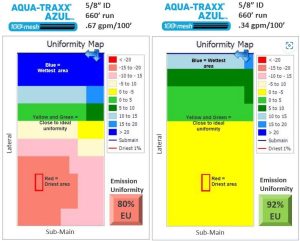Source: Western Grower Shipper
By Yvete Minor

(Editor’s Note: We had the opportunity to discuss technology & innovation with Paul McFadden of The Toro Company, one of the charter sponsors for the Western Growers Center for Innovation and Technology. Paul shared his insights into the world of agriculture and Toro’s view of how technology can help growers in our region.)
Toro brings a line of water-saving irrigation equipment to the agricultural industry that can help growers control, feasibly—up to every drop of water to their crops, for better conservation and management. Having just celebrated its 100th anniversary, Toro is traded on the NYSE (TTC), is based in the Midwest and serves more than 70 countries around the world.
Western Growers: Tell us about the technical evolution of water management in the world of agriculture.
Paul McFadden: Technology adaptation in water management in the world of agriculture is happening, but has been slow at the field level. As past president of the California Agriculture Irrigation Association (CAIA), I interact with business owners, growers, industry experts and more recently, several new irrigation startups that are owned by investment banking groups. So, in the water and irrigation space, there are a lot of people working on, and investments being poured into, trying to make things happen. There are also a lot of groups in the Silicon Valley as well as globally that are looking at sensors, information, data and monitors for use in agriculture that are still in the development phases.

WG: Recent commentary has suggested that there is a gap between innovations and getting them to market, are you seeing that too?
PM: In my opinion, the best way to describe the tech space in the ag industry is that it is fragmented. There are many companies that have a product or solution for a specific niche, but there are few companies taking a comprehensive look at managing water on-farm.

WG: Which is a big need, right? A comprehensive look at managing water?
PM: Yes! Look at California. We have the same number of reservoirs that we have had since 1979 (outside of a couple of small regional reservoirs) when the last one was built, and our population during that time has doubled. We all know the effects of the recent drought and ground water supplies. So, yes, we need to find new ways to manage our water. Not only quantity, but the quality. Our resources have become more strained, and there’s increasing demands placed on water—especially clean drinking water that’s safe. There even becomes a need to truck water into small towns, some just east of San Francisco as well as the east side of the Central Valley, because the wells that they were pumping from went dry.
We all have to be better stewards of the water available.
Now, of all the irrigated farmland in the United States, roughly 8-10 percent uses drip and micro-irrigation technology depending on the region and type of crop being grown. In California, 35 percent of all the irrigated farm land that is drip irrigated, which works out to two-thirds of the acreage using drip and micro-irrigation in the United States is done right here in California. That tells me that, number one, California growers are growing the types of crops that are suitable for drip and micro, but it also tells me that they are more progressive in thinking in terms of technology or thinking about what they can do to use these resources more wisely, which is encouraging.
Since 1926, Western Growers has taken the lead and this is just another step in taking that journey.

WG: As an Advisory Council member and sponsor of Western Growers Center for Innovation & Technology, what is your vision for us? What would success look like or what would you like to see happen?
PM: The Center is a fantastic idea. Western Growers has really taken the lead on partnering with these startups and new technologies and getting those companies’ exposure amongst its members and the broader community. Hank Giclas (WG senior vice president, strategic planning, science & technology) has been great about helping vet the ideas, and once they are proven that they could work and are worthy, they are brought in and developed. It has worked out well. There have been smaller groups that are popping up, at Fresno State and Silicon Valley and locally in Salinas. But, with the number of people looking really hard at the needs, and willing to support the efforts, it’s a great thing to see Western Growers help these startups bring their ideas forward, fine-tune them and share them with the world of agriculture.
Western Growers always does things first class, and while it will take a little bit of time to build some momentum, a lot of progress has been made. It was just a couple of years ago that Bruce Taylor (of Taylor Farms) announced his vision (at the Western Growers convention in Las Vegas) and the Center is now open. There are 14 startups in the space, and we are seen as the “go to” for new ideas and change agents. It’s going to take time; WG needs to continue to publicize it and we are all going to need to pitch in. It can’t be accomplished alone.
I’m excited and Toro is excited to be a part of it, and we are looking forward to seeing all of the innovation that will come out of it and implemented. There are some talented and bright individuals in residency at the Center and that conduit to the growers and the agriculture community is a much-needed role.
Article and interview by Yvette Minor, published in Western Grower Shipper





